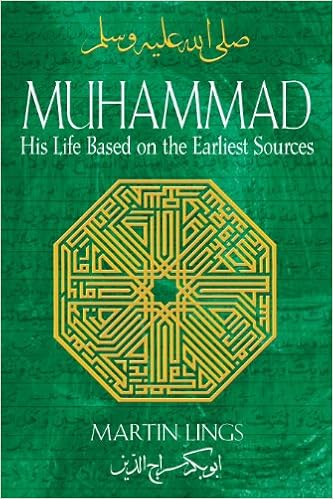Showing posts with label Martin Lings. Show all posts
Showing posts with label Martin Lings. Show all posts
Wednesday, December 21, 2011
4 useful, online (and free) Islamic studies resources
I thought I would share the links to 4 online Islamic studies resources that I have found to be quite useful in my personal studies. The first 2 are books that I own (and now also have on my hard-drive), the latter 2 I did not have before discovering them online, but have now also found a cozy place on my hard-drive:
Martin Lings', Muhammad - His Life Based On The Earliest Sources - this is my favorite biography of Muhammad, after Guillaume's English translation of Ibn Ishaq's, Sirat Rasul Allah, under the title - The Life of Muhammad (Oxford, 1955; 10th impression 1995).
Ahamd Von Denffer's, Ulam al-Qur'an - An Introduction to the Sciences of the Qur'an - though not as comprehensive as Abu Ammaar Yasir Qadhi's, An Introduction to the Sciences of the Qur'an (1999), it is a solid treatment, especially for those who are just beginning to explore this particular subject.
al-Tirmidhi's, Jami' al-Tirmidhi - this is one of the six major Sunni Hadith collections (I personally consider it to be the third most reliable after Shahih Bukhari and Shahih Muslim).
The Qur'anic Manuscripts - a good introduction to the early history of Qur'anic manuscripts; this pdf document seems to be related to THIS online article (I recommend Muhammad Mustafa al-Azami's, The History of the Qur'anic Text (2003) to those who can afford it).
ENJOY!!!
Grace and peace,
David
Labels:
Islam,
Martin Lings
Friday, May 21, 2010
Narratives from the early life of Muhammad and their Biblical undertones
“One day, several months after our return, when he and his brother were with some lambs of ours behind our tents, his brother came running to us and said: ‘That Qurayshite brother of mine! Two men clothed in white have taken him and have laid him down and opened his breast and they are stirring it with their hands.’ So I and his father went to him and we found him standing, but his face was very pale. We drew him to us and said: ‘What aileth thee, my son?’ He said: ‘ Two men clothed in white came to me and laid me down and opened my breast and searched it for I know not what.”[1]
Halīmah and Hārith her husband looked this way and that, but there was no sign of the men, nor was there any blood or any or any wound to bear out what the two boys had said, No amount of questioning would make them take back their words or modify them in any respect. Yet there was not even the trace of a scar on the breast of their foster-child nor any blemish on his perfect little body. The only unusual feature was in the middle of his back between the shoulders: a small but distinct oval mark where the flesh was slightly raised, as it were from the impress of a cupping glass; but that had been there at birth.
In after-years he was able to describe the event more fully: “There came unto me two men, clothed in white, with a gold basin full of snow. Then they laid hold of me, and splitting open my breast the brought forth my heart. This likewise they split open and took from it a black clot which they cast away. Then they washed my heart and my breast with the snow.”[2] He also said: “Satan toucheth every son of Adam the day his mother beareth him, save only Mary and her son.”[3]
Notes: [1] Sīrat Rasūl Allāh; [2] Kitāb at-Tabaqāt-Kabīr; [3] Sahih al-Bukhārī, LX.54.
I discern some theological implications from the above narratives that echo certain themes from the Bible. From Job we read:
What is man, that he should be clean? And he that is born of a woman, that he should be righteous? (5:14 – ASV)
From the Psalms:
Purify me with hyssop, and I shall be clean: Wash me, and I shall be whiter than snow. Make me to hear joy and gladness, That the bones which thou hast broken may rejoice. Hide thy face from my sins, And blot out all mine iniquities. Create in me a clean heart, O God; And renew a right spirit within me. (51:7-10 – ASV)
And in the epistle of 1 John we read:
And ye know that he was manifested to take away sins; and in him is no sin. (3:5 – ASV; see also 2 Cor. 5:21; Heb. 4:15, 7:26; 1 Peter 2:22)
Grace and peace,
David
Labels:
Islam,
Martin Lings
Subscribe to:
Posts (Atom)
